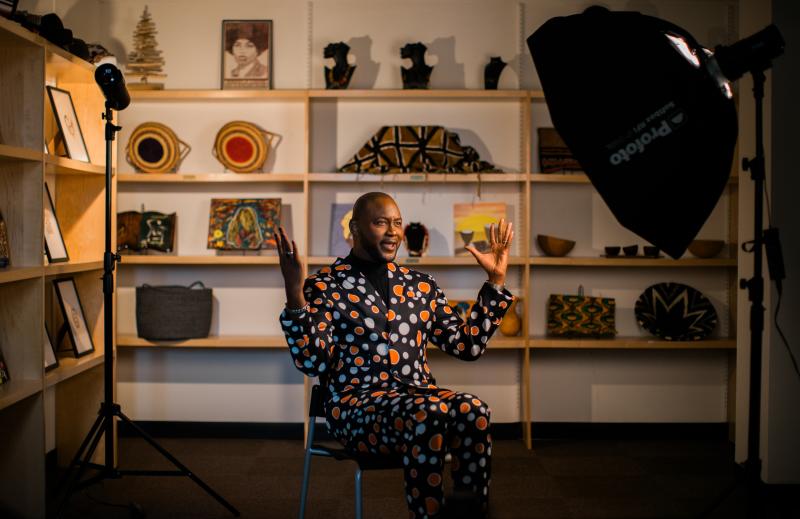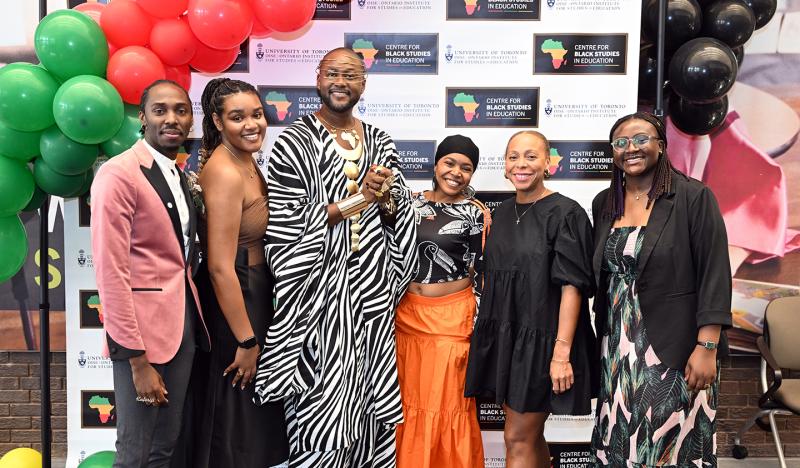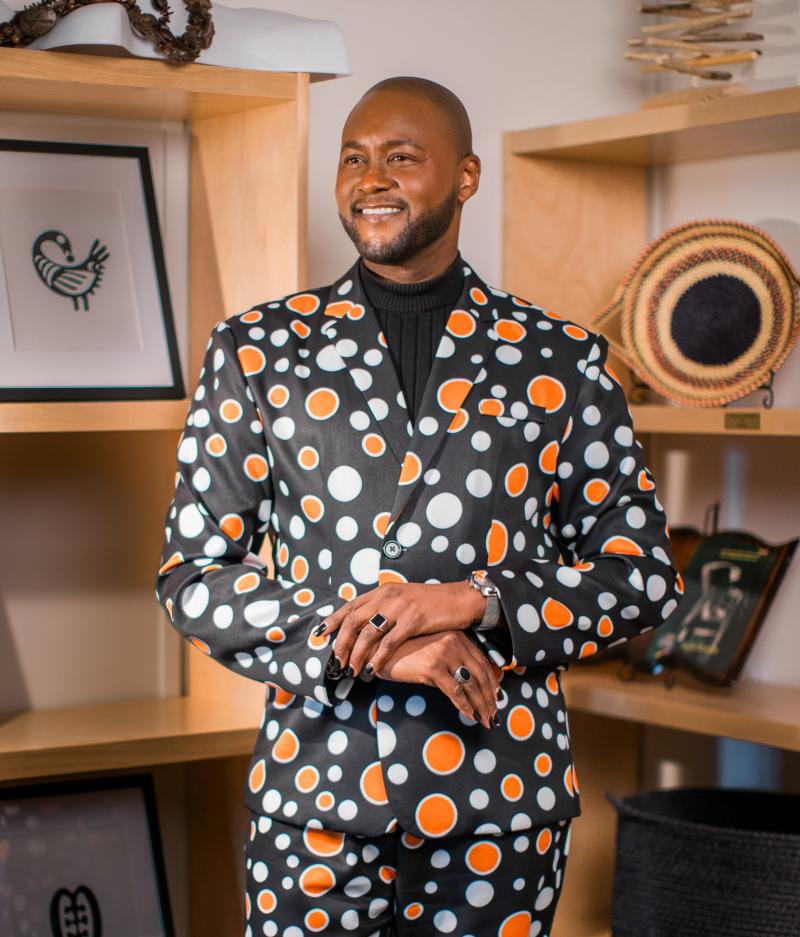February 20, 2025 | Alumni | Campus
Championing Black excellence in education: A conversation with Dr. ABC
By Alice Lawlor

Dr. ABC being interviewed at the Centre for Black Studies in Education. Photo by Matthew Volpe.
Dr. Andrew B. Campbell (PhD 2014) — better known as Dr. ABC — is a U of T legend. He’s a passionate educator, an advocate for racial justice in education and a proud alumnus of the Ontario Institute for Studies in Education (OISE), where he earned his PhD in educational policy and leadership in 2014. Since then, Dr. ABC has dedicated his career to fostering equity and inclusion in classrooms and beyond.
Originally from Jamaica, Dr. ABC moved to Canada in 2008 and has since become an influential voice in teacher education. As an assistant professor of racial justice and teacher education at OISE, he plays a key role in shaping the next generation of educators through the master of teaching program. He is also the co-ordinator of the Black Future Educators Pathway (BFEP), an initiative that increases the representation of Black teachers by supporting and guiding Black teacher candidates.
In addition to his work with teachers, Dr. ABC serves as the director of the Centre for Black Studies in Education (CBSE) at OISE. Through this role, he leads critical research and advocacy efforts aimed at addressing systemic barriers in education. “I think of myself as the conductor of the CBSE,” he says. “I direct the learning, the activities, the research, the community and the joy.” In this interview, Dr. ABC reflects on his personal journey, the importance of racial justice in education and how he engages with Black History Month.
Tell us about your journey from U of T student to alum to professor. How did U of T play a role in launching your career?
When I came here as a student in 2009, I found a place where I belonged. I remember people telling me that this was the top university in Canada, and I knew that, but I also knew I deserved to be here. From that, I built a community myself. I made strong connections. I am very visible. I’ve interacted with the community, with professors, with future students.

I’m also a certified Ontario school teacher, so being in the Toronto District School Board and in educational spaces, I got to interact with OISE in more ways than just being a student. I came here for conferences and workshops. I started the journey to working here by being a sessional lecturer in leadership and in the master of teaching program, and I became full time in 2022. The journey has been very intentional.
How do you see the role of education in advancing diversity and inclusion, particularly for Black and 2SLGBTQ+ communities?
When I think of education, I think of not just the things that we learn, but the things that we must unlearn. When I do lectures and workshops, there is a lot of unlearning that the audience must go through because so much of education today comes from a very colonial space.
Being in a university as a Black professor taking up a space, my visibility is important. Representation is important, but representation is not that I have Black skin — representation is my voice. Representation is the way in which I interact with my content, the ways in which I advocate within education. I consider the work I’m doing with the BFEP and the CBSE as advocacy. Education is an amazing vehicle for advocacy work, especially for Black students, Black futures and Black possibilities.

Last year, you won a Black History Month award from the Jamaican Canadian association, and this year you were on a U of T BHM panel. How do you personally engage with BHM?
Black History Month is like my Christmas; I do a lot of conversations, keynotes and panels. We are trying as Black people to disrupt the deficit thinking, the oppressive practices, the narratives. And how do you do that? By speaking up and speaking out.
This message is 365 days, but in Black History Month I go hard because this is a time when everybody wants a conversation. I cannot be a part of the crowd that says, ‘Well, I’m not going to do it because it’s only a month.’ My message in Black History Month is how do we cultivate, sustain, nurture and protect Black excellence?

During BHM, a lot of people ask me, ‘Can you do a workshop on anti-Black racism?’ No fault of theirs; they go to what they know. It’s my job to say, ‘I would be honoured to speak at your event, but I will not speak about anti-Black racism.’ I want to spread a message of how we strengthen and sustain Black excellence. We are here to establish Black futures in a very intentional way. People are apologetic, but there’s no need. Because here we go again: we’re unlearning.
Can you share your thoughts on how Black history is represented in education today?
We are not there yet, but we are on the journey. Black history is different for me today than it was for me as a child or as a young person in college or even as a student at OISE in 2009. There wasn’t a Black future pathway. There weren’t as many Black students in the building.
Today, I see educators of all races thinking about how to deliver the content. If you go to many schools right now, the libraries have way more books. At some schools, the Black history celebration is at a richer, deeper level. I’m hopeful that things are going to continue getting better because people are leaning into the truth. They are leaning into the knowledge and the new learning; they are realizing that a lot of what they did not know was because it wasn’t in the curriculum. It’s important that we celebrate those wins.
What advice would you give to students and young alumni who wish to follow in your footsteps as educators and advocates?
The first one is follow your dreams. I know it sounds cute… but it’s not cute, it’s real. What do I mean by that? Many of us didn’t come from spaces and places where we were taught how to dream. For myself, coming from Jamaica, from a low socioeconomic space, coming from a community that is not popular… we do not see ourselves beyond the walls, the fences, the train line that divides our communities. My dreams were bigger than those spaces. I dreamt literally out of the boxes that we were placed in as little Black boys from a very poor community.

I wanted to be more than a regular teacher, but I didn’t know what that looked like. So when I became a teacher, I realized I could become a professor. I could become a director, a dean, a provost. Today I’m living my dream, and I’m still dreaming!
Next, strive to be your authentic self. As a Black gay man who grew up in Jamaica, I know how to perform to navigate this world. But it takes a lot more effort to perform than to be. And I also say, live in a space of gratitude. I am very thankful for everything, and that brings me joy.
And the last thing I'll say is make sure you engage in community. In my book, Teachable Moments with Dr. ABC, I say, ‘In all your getting, get people.’ The things that I do, I don’t do by myself. People have contributed to what makes me amazing, from being a student at OISE to my PhD and now being a prof and an alumnus. I have always had people who have been there for me, and that for me has been important. Real community shows up.

